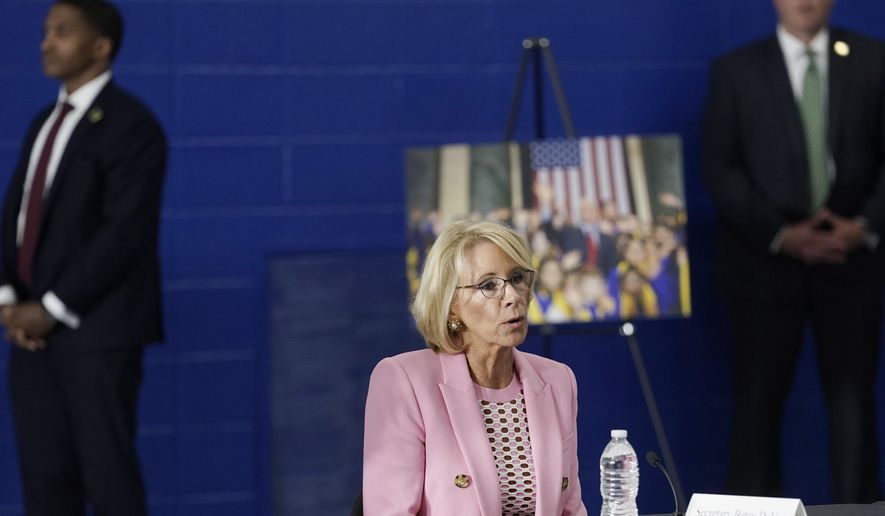House Democrats on Friday failed to override President Donald Trump’s veto of a measure that would have reversed the Education Department’s tough policy on loan forgiveness for students misled by for-profit colleges.
The House voted 238-173 in support of the override measure, coming up short of the two-thirds majority needed to send it to the Senate.
It marks a victory for Education Secretary Betsy DeVos, whose policy on student loan forgiveness was in jeopardy after Congress voted to reverse it in March. It now remains in place and will take effect July 1.
A statement from the Education Department said it looks forward to implementing a rule “that protects students from fraud, treats higher education institutions fairly and protects taxpayers.”
The measure Congress approved in March would have restored a 2016 rule created by the Obama administration. It was approved using the Congressional Review Act, which allows Congress to overturn federal rules with a simple majority of both chambers and approval of the president.
While the original measure had bipartisan support, just six Republicans voted in favor of overriding the veto, while 172 opposed it.
In calling for the override, Democrats said DeVos’ rule made it nearly impossible for cheated students to get loans canceled. They accused her of stacking the rules in favor of the for-profit college industry, which has found an ally in the Trump administration.
But Republicans said DeVos’ rule is an improvement over the Obama-era policy, which they say granted loan cancellations too freely.
“Massive loan forgiveness has long been a Democrat objective, and the Obama rule was a giant leap toward that goal. One that also ignored the high cost to taxpayers,” said Rep. Virginia Foxx, R-N.C., the ranking Republican on the House education committee.
The dispute stems from a policy known as borrower defense to repayment, which allows borrowers to get their federal student loans erased if their colleges made false claims to get them to enroll.
The rule was created in the 1990s but was expanded under President Barack Obama after the collapse of for-profit college chain Corinthian Colleges. The chain closed in 2015 after authorities found it used misleading ads to recruit students and lied about the success of its graduates.
Students could get loans forgiven under the Obama-era rule if there was evidence of significant misrepresentation or breach of contract by the college. In cases of widespread fraud, entire groups of students could get loans discharged under a single claim.
But DeVos halted the policy before it took effect, saying it had become too easy to get loans forgiven. Last year, DeVos replaced it with a new policy that she said protects taxpayers and colleges from frivolous claims.
Her rule sets a higher bar for loan relief, requiring borrowers to prove their schools knowingly misled them and caused personal financial harm. It also sets a time limit on claims, giving students up to three years after they graduate or withdraw.
Other changes include the elimination of group claims and a provision that automatically canceled loans for students who went to schools that shut down before they could graduate.
Her policy was backed by Republicans and by the for-profit college industry, which says it was unfairly targeted by the Obama administration. Democrats and consumer advocates, though, say the rule strips protections for defrauded students.
The Institute for College Access and Success on Friday said the rule will leave many defrauded students stuck repaying their loans.
“The rule creates roadblocks for defrauded students in the middle of an economic and a public health crisis, while imposing next to no consequences for the deceitful colleges,” said James Kvaal, the nonprofit’s president.
DeVos has faced sharp criticism from Democrats over her handling of the policy and a backlog of loan cancellation claims. In April, DeVos said she would process more than 170,000 claims as part of a settlement in a lawsuit alleging that she illegally halted the process while she rewrote the rule.
As of April 30, the agency said it has 130,000 pending claims out of 318,000 total received applications.
DeVos separately changed the policy to provide only partial loan relief to many students. Her update provides full discharges only if students attended programs that produce graduates with average earnings far below those of graduates at similar programs. Other students get portions of their loans erased. The Obama-era rule provided full loan forgiveness only.
Consumer groups filed a lawsuit challenging DeVos’ partial relief rule in June.




Please read our comment policy before commenting.